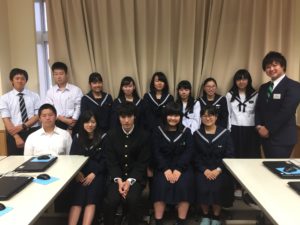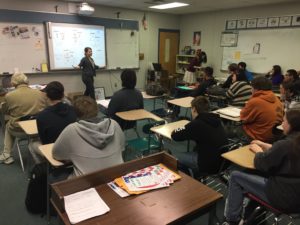By Jean Hardiman
Learning a second language involves more than simply discovering how to ask for directions or reserve a hotel room in a foreign country.
“Learning a second language is learning about the culture and traditions of people living in another country,” says David Pittenger, interim associate vice president for outreach at Marshall University. “Speaking that language is a sign of respect to the person and his or her heritage.”
It’s also key in the realm of economic development. When corporations look for places to do business, one of the first things they examine is the level of education of potential employees, according to Pittenger. In many cases, language skills and knowledge of other cultures are valued traits—and thanks to a sister school program that was established by Pittenger and Japanese outreach coordinator Shintaro Takase, they are traits that students at Huntington High School will have.

Takase with students at Yokosuka High School in Japan.
Takase was appointed to serve at Marshall University through a grant program of Japan’s Laurasian Institution. He teamed up with Huntington High School teacher Meagan Joseph to connect students in her Japanese class with students in an English class at Yokosuka High School in Japan.
In January, students at both schools began exchanging general information about themselves, providing them an opportunity to write in a foreign language and learn about fellow students on the other side of the globe. They participated in collaborative projects like creating videos about daily school life, their towns and local food and they sent letters to each other.
“Students easily realize that there are a lot of Japan-related things going on in their daily life—food, cars and media like anime, manga and TV news,” says Takase. “At the same time, I would like to emphasize that knowing more about American culture, specifically culture in West Virginia, is also beneficial for students not only for the purpose of introducing it to Japanese friends but also viewing your own culture from different angles.”
Pittenger believes building those cultural connections can be wonderful for student growth and for the growth of the Mountain State. Japanese business investment has been an important part of West Virginia’s economy for more than 30 years. According to the West Virginia Department of Commerce, Japanese business investment in West Virginia has equaled $2.6 billion and resulted in 3,782 jobs since 1986. Some of the biggest Japanese investments in West Virginia include Toyota Motor Manufacturing West Virginia, which provides 1,600 jobs; NGK Spark Plugs, which provides 600 jobs; Hino Motors, which provides 545 jobs; and Diamond Electric, which provides 340 jobs.

Joseph teaching Japanese at Huntington High School, where students are involved in the Japanese sister school program.
“When an international corporation sees that high school and college students have studied a second language, it is an indicator that the students are ready for business,” says Pittenger. “Being able to speak a second language shows that the students are curious, want to learn more about the world around them and are willing to work hard. These are the very attributes sought in future employees.”
With technology, the world is becoming increasingly connected, according to Joseph, a 2014 Marshall University graduate. It allows students to see how much they have in common with those from other cultures.
Kei Yamaguchi has been helping Joseph teach the class at Huntington High School. She was assigned to the school by the Japanese Language Education Assistant Program, which aims to promote Japanese language education in K-12 schools in America and other countries. The sister school project motivates students to travel and experience the Japanese culture first-hand, according to Yamaguchi.
Such an experience can build a strong workforce. In essence, being able to speak a second language is a value-added component of a student’s education.
“Imagine two applicants for a large international company,” says Pittenger. “Both are excellent students with good grades, but one speaks a foreign language. Chances are the bilingual student will be more attractive to the employer. All commerce depends on mutual respect and clear communication. Being able to speak the language of a business partner, even at a simple level, opens many doors and sets the stage for success.”
Whatever these students pursue, they will pursue it as more globally responsible citizens, according to Takase.
“Students know why showing respect to another country’s language, culture and people is important,” he says. “Along the learning process, they mostly face questions regarding linguistic and cultural differences, even including people’s ways of thinking. Students treat differences as positive and respectful, and they surely understand that such an attitude toward international communities is essential to becoming better world citizens. Through the years, predecessors in various fields have been making an effort to build special relationships between the U.S. and Japan. Our sister school program is the very bottom of this contribution. Even at a grassroots level, however, each student in America and Japan will be able to make a difference from their experience, and I believe they will also help impact society from the fields to which they belong.”
 About the Author
About the Author
Jean Hardiman is a communications specialist for Marshall University. She previously worked for The Herald Dispatch for 17 years and now does freelance writing for publications, businesses and organizations throughout the region. She lives in Huntington with her husband and daughters and finds joy in writing about West Virginia’s events and people.



